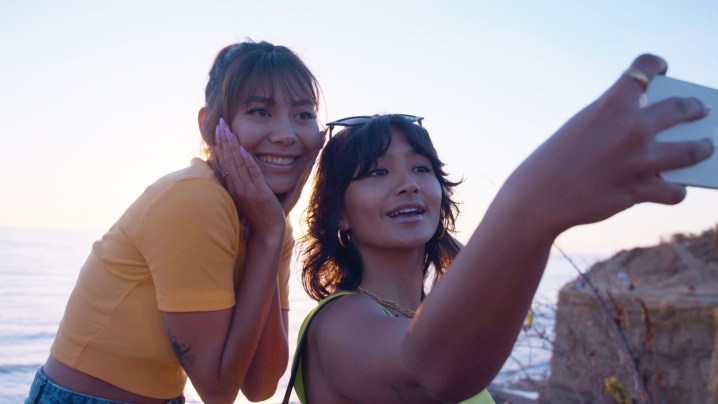It’s 2022, and TikTok is seemingly everywhere. As the most downloaded app in the world, TikTok is on billions of phones in almost every country. Even if you don’t have it, chances are you’ve seen at least some of the viral videos, dances, or memes that have permeated the larger culture. From movies to video games, TikTok’s influence is inescapable.
For Shalini Kantayya, that’s a problem. As she shows in her latest documentary, TikTok, Boom., the wildly popular social media app possesses enormous power for good … but also the potential to limit artistic expression and free speech. In an interview with Digital Trends, Kantayya discusses why she wanted to make a documentary about TikTok and the need for government agencies, and the general public, to understand how TikTok is run and who decides what kind of content they can see.
Digital Trends: Why make a documentary about TikTok?
Shalini Kantayya: Like millions of Americans during the pandemic, I started using TikTok and was astonished, dazzled, and horrified about how addictive it was and how quickly it seemed to know my unique interests, quirks, location, and ethnicity.

At the same time, I started hearing about it was coming under scrutiny by the Army and banned from government phones. So I was interested in how a social media app best known for teenagers dancing and writing cultural memes, becomes the center of a geopolitical controversy between the world’s biggest superpowers. And that sort of set me on the journey to make this film.
What I love about your film is it’s not just about one thing. There’s a quote in the doc that states that TikTok is “a cybersecurity story, an algorithm story, a bias story, and a geopolitical story.” Was that intentional to encompass all those different narratives centering around TikTok?
This was a mammoth story to grasp, and at the same time, I had a very short timeline. What I tried to do in the film is construct the larger TikTok narrative the stories of Gen Z influencers and creators whose lives have been irrevocably changed by the platform. I try to tell the story through their eyes, and their stories sort of dovetail with some of these larger themes around child online protection, data privacy, and transparency around the app’s algorithmic feeds.
Did you encounter any issues with TikTok while making this documentary?
As a journalist and as a filmmaker, our jobs are to shine a light on the dark spaces in our democracies and to look at powerful interests at play, which is never comfortable. I think the thing that I have on my side is the truth, and that all of the facts in the film are well-vetted.
We really relied on some very brave reporting from whistleblowers, which we’ve seen in the context of other social media companies to be really key in giving us any sense of transparency of what’s happening at some of these big social media tech companies.
In your initial investigation, you talk with a number of influencers like Deja Foxx and Spencer Polaco, just to name a few of them. How did you decide who to feature and what you wanted to get from them?
Well, I was so excited to make a film that was focused on the voices of Gen Z creators because they are the first generation of human beings that are growing up online. It’s almost like this massive, uncontrolled experiment. Every generation after Gen Z will have come of age on these apps and we don’t fully understand or are prepared for how this is changing our humanity.

So I was very clear that I wanted to focus on Gen Z creators who I think were the driving force behind TikTok becoming this global sensation. As with all of the characters in the film, their lives have changed because of TikTok. I was on Hollywood Boulevard with Spencer Polaco and I felt like I was with George Clooney or Brad Pitt. These 13-year-old girls were coming up and crying when they saw him, which is incredible for a beatboxer.
And then you have people like Deja, who was working on the Kamala Harris campaign when TikTok got banned from all government phones. Her story really coincides with the app being banned from the Army, the Pentagon, and all of these government agencies. It made me curious because I had never heard of the military banning a social media app before.
What surprised you in your research for this documentary? Because for me, I was shocked to learn that TikTok has an “Ugly Content Policy” and they can shadow-ban content they don’t like.
Yes. I was shocked and astonished by reporting that came from whistleblowers that content moderators at TikTok Germany were getting moderation guidelines written in Mandarin with crude translations to shadow-ban LGBTQ people, people with disabilities, etc. It was done under the guise of protecting them from cyberbullying but instead of punishing the bullies, you’re punishing the people who are bullied by not showing their content.
Another whistleblower in Brazil had similar content moderation guidelines, again written in Mandarin and crudely translated into Portuguese, that advised them to ban “ugly people,” people that were filming themselves in impoverished backgrounds, obese content makers, etc.
Our public squares are moving to these big tech platforms that don’t have any transparency or accountability. What I worry about is, what free speech is to Elon Musk, to content moderators at TikTok, may not be free speech that we agree upon as citizens of a democracy. I really think TikTok, Boom. raises some larger questions about how we moderate content and all of these social media platforms.
What do you want viewers to take away from TikTok, Boom. after they’ve watched it?
I hope that my film will spark conversations about how we can better understand the technologies that we interact with every day. I feel that oftentimes the adoption curve of platforms like TikTok is so quick that no one understands how these platforms work. So I hope that we’ll have greater conversations about how content is moderated.
For TikTok in particular, I hope there are conversations about how we protect children online. I think our child online protection laws haven’t been updated since the advent of the Internet and we need to better grapple with what it means to unleash these incredibly persuasive recommendation algorithms on brains that are not fully developed and how we protect children from these really powerful and hugely influential algorithms.
You can watch TikTok, Boom. in its entirety at PBS.org.
Editors' Recommendations
- Martin Scorsese: film director, movie lover, TikTok star?
- Collide director on making a modern Magnolia about love and loss
- Dreaming Walls directors on the legacy of the Chelsea Hotel




